One of the biggest barriers to being a Conscious leader is minimizing unconscious biases. This means we need to start by listening with all our senses. This will help us hear the message behind the words. There are, however, many obstacles to being an effective listener, such as:
-
External noise
-
Mind chatter
-
Being self-consumed
-
Not knowing what to listen for (I have spent years training people on this skill, particularly leaders, sales teams, and project managers.)
-
Our perceptions, beliefs, and biases of the person.
In this episode, we will explore the reality of biases and what you can do to limit their influence on your relationships and leadership.
by Suzanne F. Stevens, Conscious Leadership and Social Contribution Cultivator, Founder, YouMeWe Social Impact Group Inc., Part of the Nobody Wants to Work Series.
Understanding your unconscious biases and how they impact an inclusive culture
To be a conscious leader that is responsible, aware, and creates a culture of ‘WE,’ we need to bring our unconscious biases to our consciousness. HERE, we have the POWER to reduce their influence on how we lead and interact.
To access your unconscious, I’d like you to close your eyes. Take a couple of deep breaths. I’m going to ask you a question with various contexts. Permit yourself to honor your first thought and feeling. No judgment.
Who do you think would bring the most innovative solutions forward?
-
-
The person with purple hair or the person with grey hair?
-
A religious person or someone who is an atheist?
-
A private university graduate, a college graduate, or an entrepreneur with a high school education?
-
Someone who likes to enjoy a cocktail or someone who abstains.
-
Someone who enjoys sitting in the sun or someone who prefers the shade.
-
A Gen Z who is well educated or someone with years of experience?
-
In any of these scenarios, did your mind favor one person over another?
The person YOU favored… are they more like you?
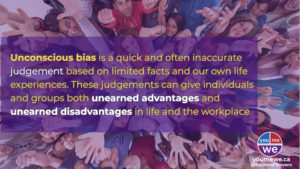 Unconscious bias is a quick and often inaccurate judgment based on limited facts and our own life experiences. These judgments can give individuals and groups both unearned advantages and unearned disadvantages in life and the workplace.
Unconscious bias is a quick and often inaccurate judgment based on limited facts and our own life experiences. These judgments can give individuals and groups both unearned advantages and unearned disadvantages in life and the workplace.
Why do unconscious biases exist?
It is NATURAL to gravitate to people like you.
So, no shame or blame.
We all have biases. We are born with them.
As I trained organizations for over 20 years in leadership, Sales, and Conscious Conversations, the root of every connection was the ability to build rapport. At the core of rapport building is having the flexibility to reduce differences at a subconscious level (subconscious to the person you’re trying to connect with – you’re consciously flexing your skills).
Why? Because we connect with people like us. It’s natural.
Take your friends, for example.
-
-
Do you have similar interests?
-
Do you laugh at the same Dad jokes?
-
Do they have a similar demeanor?
-
Are you the same culture, race, religion, gender, or sexual orientation?
-
This is called the AFFINITY BIAS, which is the tendency to favor people like you in some way.
Our biases are influenced by so many sources, such as:
-
-
life experiences,
-
things other people tell us,
-
media portrayals,
-
social media
-
TV and movies
-
institutional influences
-
Our unconscious is bombarded with overwhelming messages.
And our biases are always being confirmed or disproved.
But be kind to yourself. Again, biases are natural.
According to NLP (Neurolinguistic Programming), our unconscious mind processes 11 million bits of information every second. But our conscious minds can handle only 134 bits of information a second. So, to manage all that information our unconscious mind receives, we delete, distort, or generalize. This means our conscious mind sifts through reams of unconscious information (including beliefs and biases) and makes conclusions.
Let’s dive deeper into how biases show up at work and are barriers to an inclusive culture.
I produced and hosted five diversity, equity, inclusion & belonging panels with advocates and community and business leaders in five cohorts: the black and Asian community, Indigenous Peoples, People with Disabilities, and Intersectional Feminists.
Here is a glimpse from 7 hours of fantastic content into what unconscious biases appear in the workplace and how they sabotage an inclusive culture.
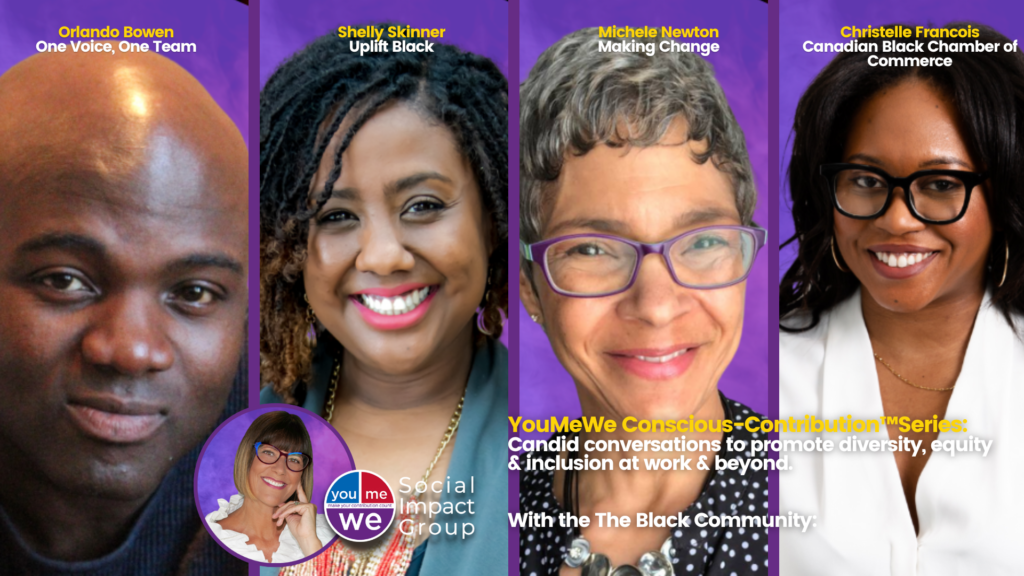
A community leader Michèle Newton, shared on a Diversity, Equity, Inclusion, and Belonging panel series that I hosted, “If you are in a position of power or leadership, it is your duty and responsibility to leverage your power to empower others. That is what leaders do. Leaders empower others.”
To access the panel dialogue visit: https://youmewe.ca/deib-candid-conversations/
People can be biased about anything – beyond the more prevalent gender, race, culture, age, color, size, religion, and ability. But, also, being an introvert or extrovert, hair color, height, smoking…do I need to continue?
I remember when I started my training career (so many years ago). During my interview with the president, he said he wanted to work with someone he could go for a beer with—back in the day, a common desire. He was saying he wants to work with someone “like him.” A seemingly innocent comment.
But, say I didn’t drink by choice, need, or religious reasons.
Not to mention if I didn’t drink beer? I would have been Shut out of luck.
Let’s just say I secure the job.
This is a preference, and it is a bias—perhaps UNCONSCIOUS, but a bias non the less.
Bringing unconscious biases to consciousness is critical to creating an inclusive culture.
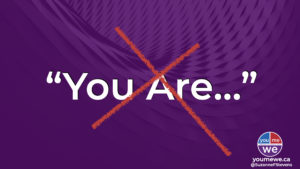 Any time you hear or say, “YOU ARE,” pay attention to what comes after that. It is often a bias gone through the filters in our mind that delete, distort, or generalize.
Any time you hear or say, “YOU ARE,” pay attention to what comes after that. It is often a bias gone through the filters in our mind that delete, distort, or generalize.
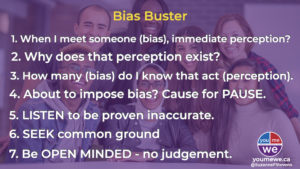 To become aware of your biases, you need to have an honest conversation with yourself. Download the 7-question Bias Buster to minimize your biases’ impact. (Bias Buster Questions)
To become aware of your biases, you need to have an honest conversation with yourself. Download the 7-question Bias Buster to minimize your biases’ impact. (Bias Buster Questions)
For more on biases – visit a Harvard evaluation – it takes 15 minutes.
https://implicit.harvard.edu/implicit/
Becoming aware of your preferences takes a conscious effort to shine a light on them by trying to understand why they exist.
The most effective action to confront unconscious biases
If you have a bias toward a particular group of people, seek opportunities to work alongside them. Biases often exist because of a lack of understanding; creating a connection can diminish any predispositions and develop a new appreciation.
Traveling to diverse cultures is a beautiful way to gain an appreciation for differences and celebrate sameness.
Don’t want to lose your luggage, be stranded, or hang out at the airport for hours?
Good news. You don’t need to get on a plane.
Consciously, spend time with people unlike you. Have a conversation with a homeless person, visit an Indigenous community, make a Jewish friend, volunteer at a BlackLivesMatter event, or ask a Woman how they would address a problem—you’ll be amazed by their insight.
As Conscious Leaders, the most effective action you can take to reduce workplace biases and create an inclusive culture is to connect your team around a task regularly. This will significantly alter preferences by gaining understanding, respect, and appreciation for talents, perspectives, and approaches.
Or take them off-site to contribute to the social initiative in the community. Activate dopamine. The feel-good drug will open people up in profound ways.
What can you do now to make your contribution count?
Personally, seek an opportunity to expand your network with diverse people. Who knows, you may make a friend.
As a Conscious leader, start celebrating diversity with lunches from different cultures. Education sessions on other beliefs, and most importantly, connect your team over a task – internally or contributing to something bigger than themselves.
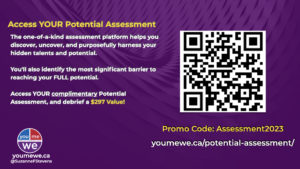 Thanks for joining me! I’m Suzanne F. Stevens, and at YouMeWe Social Impact Group, we grow Conscious leaders, their influence, and social impact—sustainably.
Thanks for joining me! I’m Suzanne F. Stevens, and at YouMeWe Social Impact Group, we grow Conscious leaders, their influence, and social impact—sustainably.
As part of our commitment to this mission, I invite you to complete a Potential Assessment– a transformation tool highlighting your strengths and growth opportunities. youmewe.ca/potential-assessment/
The best part, it reveals the biggest barrier to reaching your FULL POTENTIAL—a $297 value with YouMeWe compliments. Visit youmewe.ca/potential-assessment/ to gain access to this accurate transformation tool.
The article was originally posted by %author_name% Originally posted on%post_title%
. This article originally posted on Source